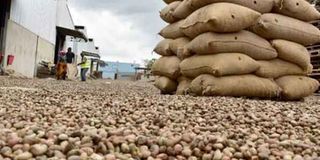Old cashewnut trading system still in use: government

Dar es Salaam. The government has said the warehouse receipt system (WRS) will be used alongside the online trading system under the Tanzania Mercantile Exchange (TMX) Plc in trading raw cashew nuts (RCNs) during the 2020/21 harvest season.
Agriculture minister Japhet Hasunga made the announcement after a cashews stakeholders meeting held in Lindi Region at the weekend during which the 2020/21 trading season was declared to commence on September 1 this year.
Addressing journalists after the meeting, Mr Hasunga said that, since some countries with potential buyers are yet to open their skies due to the Covid-19 pandemic, the two trading systems will be used jointly.
“Domestic buyers will submit their bids in the boxes located in their cooperative societies through the WRS, while distance buyers will bid online - after which the highest offers will be declared” winners, he said.
He instructed stakeholders - including farmers and buyers - to effectively use the WRS system for collection, storage and auctioning RCNs, saying it is the system that will determine the achievements of other newly-introduced systems.
“Success of the TMX will depend on how WRS has been implemented in cashew nuts collections, grading, storage and preparation of catalogues that are used for trading merchandise worldwide,” he said.
He warned that disruptions of the WRS would lead to huge challenges for the online trading system.
Mr Hasunga - who was the outgoing Vwawa legislator in Parliament - said this farming season, some 300,000 tonnes of RCNs are expected to be harvested. In the event, successful bidders/buyers are required to complete payment within four days after every auction.
Farmers will be paid ten days at the latest after auctions - although some payments could be made five, six, seven or eight days after sales, the minister stated.
He instructed leaders of Agricultural Marketing Cooperative Societies (Amcos) to ensure farmers are paid according to the instructions, regulations and guidelines after buyers have effected payments.
“Last season, the government was forced to take over buyers’ bonds deposits in order to pay farmers... Buyers are reminded to comply with instructions and regulations” to avoid farmers’ outcries, he said.
Revealing that the government recently issued Sh20 billion to service farmers’ debts accrued from the 2018/19 RCNs purchased by the government when it bought RCNs from farmers at Sh3,300 a kilo, the minister instructed that “The Cereals and Other Produce Board (CPB) should ensure that all farmers would have been paid by September 1 this year when the new season commences.” This being an election year; he directed that cashews should be sold within a short interval instead of waiting for higher accumulations.
“Hopefully, preparations for the season are being finalized. Auctions will commence immediately after the merchandise has been received in warehouses, and buyers have secured licensing from the Cashewnut Board of Tanzania (CBT),” he said.
Speaking to The Citizen yesterday, the Masasi and Mtwara Cooperative Union (Mamcu) and the Tunduru Agricultural Marketing Cooperative Union (Tamcu) leaders said packaging materials and efficiency of the newly-introduced online system caused heating debate during the meeting.
“Although the government has pledged to release Sh5 billion for sacks used in the 2018/19 harvest season when the government purchased RCNs, cooperatives struggle to meet demand for lack of funds,” said the Mamcu general manager Protence Rwiza. Besides, they are worried about the new online trading system, which didn’t do that well with sesame when tested earlier - and suggested that more time is required for the system to benefit farmers.
“The online system needs to be used first as a pilot project in order to know its advantages and disadvantages before commenting,” said Tamcu general manager Imani Kalembo.
Last season, Tanzania produced 232,000 tonnes of cashew nuts, but farmers were challenged by insufficient packaging materials, poor weather and logistics.




